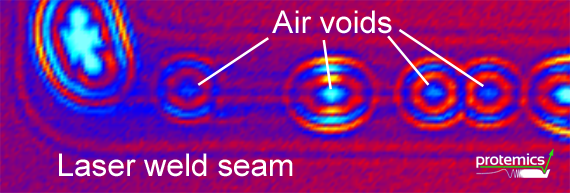
TeraSpike microprobes from Protemics are highlighted in the May issue of LaserFocusWorld as novel non-destructive testing tool: As demonstrated in a recent study undertaken by Protemics GmbH and the Fraunhofer ILT (Aachen) the non-destructive detection of micron-scale air voids
and inhomogeneity in laser weld seams is possible for the first time also in optically demanding polymers. This success is the result of using the Terahertz light transparency of polymers together with the high-resolution near-field imaging capabilities of the TeraSpike microprobes.
So far, the control of a laser weld process is often associated with the costly destruction of the product since current non-destructive testing methods such as optical microscopy (based on light from the visible or infrared region) are restrained by the large absorption or scattering found in many plastics. Hence, for certain visually non-transparent materials such as polypropylene, polyamide and fiber reinforced polymers the currently available non-destructive testing methods are unable to uncover defects and inhomogeneity in laser welds.
Terahertz microprobes from Protemics have now paved the way for the non-destructive inspection of structures based on such critical types of polymers by imaging the scattering light closed to the surface of the sample under test which is caused by the small defects. Standard Terahertz systems based on far-field detectors are virtually blind to this scattering light and are also lacking the required micron-scale spatial resolution.